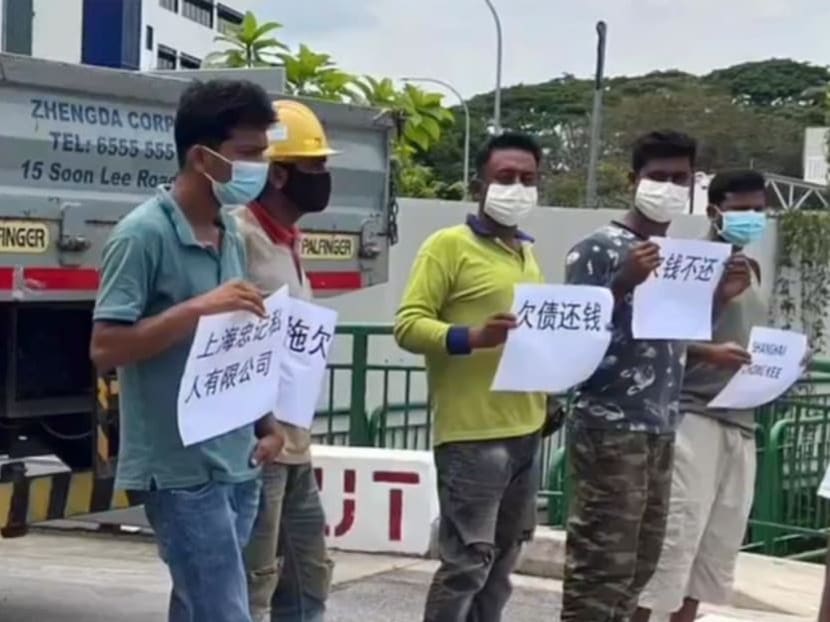Ang Mo Kio worker protest: 268 migrant workers owed salaries by construction company Shanghai Chong Kee
SINGAPORE – A total of 268 migrant workers were owed salaries by construction firm Shanghai Chong Kee, which was the subject of an Oct 18 protest by migrant workers in Ang Mo Kio, said Senior Minister of State for Manpower Zaqy Mohamad in Parliament on Wednesday (Nov 9).

- Mr Zaqy Mohamad told Parliament that 268 migrant workers were owed salaries by construction firm Shanghai Chong Kee
- The firm was the subject of an Oct 18 protest by migrant workers in Ang Mo Kio
- 10 workers had held signs and blocked an entrance of an industrial building demanding overdue salaries
- Mr Zaqy, Senior Minister of State for Manpower, said investigations found that the 10 workers were employed by a sub-contractor Zhengda Corporation
SINGAPORE — A total of 268 migrant workers were owed salaries by construction firm Shanghai Chong Kee, which was the subject of an Oct 18 protest by migrant workers in Ang Mo Kio, said Senior Minister of State for Manpower Zaqy Mohamad in Parliament on Wednesday (Nov 9).
Part of the payments have been settled by the company as of Oct 31, and the Ministry of Manpower (MOM) is working with the company on a payment schedule in instalments for the rest.
“We understand that during these challenging times, sometimes payments are delayed. I think in the construction sector, we all know the challenges that they are facing too," said Mr Zaqy.
"So we try to mediate and see how best we can come to a middle ground because otherwise, you push too hard and the company folds and that’s not good for the workers either," he added.
He was answering a supplementary question by Member of Parliament Lim Biow Chuan from Mountbatten Single Member Constituency about a rare protest on Oct 18 by 10 migrant workers, who allegedly held up signs and blocked the entrance of an industrial building in Ang Mo Kio over unpaid salaries.
Mr Lim had filed a parliamentary question about whether workers were aware of the illegality of their actions, and called for MOM and the Ministry of Home Affairs to take action against companies that fail to pay workers’ salaries, and prosecute workers who make public protests.
According to Mr Zaqy, investigations by MOM reveal that the 10 workers involved in the protest were employed by Zhengda Corporation, which is a sub-contractor.
Out of them, five had salary claims. They have been assisted by MOM and have since been paid their overdue salaries in full.
The other five were from the same company but did not have any salary claims.
Mr Zaqy said that police investigations are still ongoing.
Mr Lim has also asked whether MOM had informed migrant workers of the available avenues to seek recourse against employers who failed to pay their salaries.
Mr Zaqy replied that migrant workers are informed comprehensively of their employment rights, the support channels available, as well as on lawful and responsible behaviour, including the laws on local assembly or procession in public places.
This is communicated through a comprehensive migrant workers’ guide, monthly newsletters, infographics, and a compulsory settling-in programme by MOM, conducted within two weeks of their arrival in Singapore in their native languages.
Workers can also seek help from unions and non-governmental organisations such as the Migrant Workers’ Centre, MOM and the Tripartite Alliance for Dispute Management (TADM) for salary claims.
On average, TADM handles about 160 salary claims for migrant workers each month this year, compared with a monthly average of 410 salary claims recorded in 2019.
In another supplementary question, MP Louis Ng of Nee Soon Group Representative Constituency asked for the percentage of workers who are not paid electronically.
Mr Zaqy replied that ever since electronic payment was made compulsory during the circuit breaker in 2020, almost all employers have been making payments electronically, which is an increase from the 75 per cent before the Covid-19 pandemic.
He added that administrative issues and workers’ preferences to be paid in cash were often cited as the main reasons for employers who have yet to pay workers electronically.








